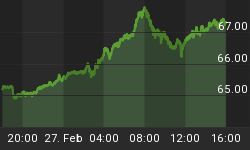Mr Bernanke and his close allies at the Fed in Washington are worried by signs that the U.S. recovery is running out of steam. The ECRI leading indicator published by the Economic Cycle Research Institute has collapsed to a 45-week low of -5.7 in the most precipitous slide for half a century. Such a reading typically portends contraction within three months or so. Today we saw the sad employment and housing figures appearing to add to this picture.
The Eurozone is seeing a temporary renewal of the Euro 442 billion of Quantitative Easing issued a year ago and now being replaced with similar, but temporary financing for the banks. Such policies need more time to work, worldwide. But the Eurozone is placing regulation over growth. We believe this is a serious mistake that will certainly make Mr. Bernanke's fear realized. The markets, by falling as they have this week are confirming this is their fear too. We now live in post-information revolutionary world. This means that policies or announcement of policy intentions generally affects consumers, banks, markets and business, rapidly. Most importantly, it affects confidence from top to bottom. Government actions of late have damaged confidence and by extension the robustness of developed world economies.

While there has been a pick-up in business in the last year it lacks the robust quality that comes with future confidence. But governments have to battle between financial correctness and good practical sense. A man may have over-borrowed and then agreed to a repayment plan, but he may not be able to stick to it because the expected increase in cash flow has been delayed for reasons out of his control. Therefore two choices lie ahead, to bankrupt him or to give him more time to recover so he can stick to his obligations. Bankrupt him and you have the danger of having to compromise the debt [default and negotiate it down to a repayable level] or destroy his cooperation and turn the debt bad. At international level such consequences are far more complex and potentially damaging. That's where the world's rich nations are now. They want to cut spending and raise taxes before anyone is certain that the recovery is robust enough to cope. This was tried in the 1930's but under circumstances where economies could cope. Bear in mind, this is not just the U.S. but the entire developed world. Eurozone problems have knocked the stuffing out of its economies as all nations, from Germany down have over-borrowed and now need to cut back spending.
At this stage, after the world saw the market shrink, primarily through investor de-leveraging and investor implosion, so is better prepared for anything like that now. De-leveraging will be less, as will investor implosions. But the effect on global confidence will be much harder than in 2007 as people realize that they have to pay the costs of government failures and thus will protect themselves more solidly now. Trust in governments to resolve such problems, has been damaged badly. Businesses will be much more cautious about exposing themselves to similar dangers in the future and banks will make sure they are not hurt, even if it means curtailing loans and profits in favor of a sound balance sheet.
The Extension of falling Confidence
Since 2007 what has happened to the perception surrounding gold and to a far lesser extent silver? After a relatively brief dip in the gold price, gold recovered and moved to new highs. At that time it was still tarred with the "barbarous relic" image and considered of less quality than global currencies. Since then the broad public perception has noted how gold has provided an ability to hold its price and to rise in the face of currency's inherent weaknesses. Gold is rising in the face of stagnating and weakening Stock Exchanges, in the face of fears of recession, in the face of sovereign debt crises and a general sagging of confidence in the financial system. Gold is not simply a safe-haven. The sight of central banks turning from sellers of gold to overall buyers and at worst firm holders of gold has been a step back towards gold in the monetary system.

It is now moving back to the position it once held, the underlying touchstone of value.
For years now we have highlighted the reality that there will come a time when markets and their investors will not check the gold price in the U.S. $ but conversely will measure the value of the U.S. $ will measure gold. In many minor currencies this is already an investor perception.
How will the gold price behave in the dark days ahead?
Subscribers only - Subscribe through www.GoldForecaster.com















